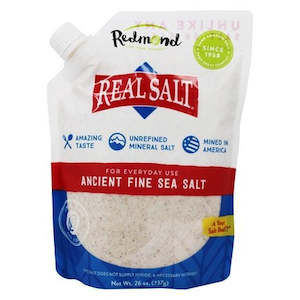Redmond Real Salt

Real Salt - Ancient Fine Sea Salt - 26 oz. (737 g)
Real Salt Ancient Fine Sea Salt means real flavor. Take a taste test! First taste Redmond Trading's Ancient Fine Real Salt, then try any other salt - the difference will amaze you! Is your salt real? Real Salt means - well, real, authentic salt. A quick glance at the ingredients label on most salts might surprise you! Many salts contain anti-caking agents and even dextrose (sugar). Others have been heat processed and stripped of their natural trace minerals. Real Salt brand, on the other hand, is unrefined and full of natural minerals and flavor - the way salt was meant to be savored. Real Salt's unique coloring comes from more than 60 trace minerals, which also lend an amazing flavor that has helped Real Salt become the best-selling brand of sea salt in health food stores. Real Salt is best tasting, healthiest sea salt you can find.
About Real Salt
The Real Salt Story
Long ago in what is now Central Utah, Native Americans found a mineral-rich salt deposit from an ancient sea when they saw deer eating the soil. In 1959, Milo and Lamar Bosshardt were struggling to keep their family farm afloat when they discovered that this salt deposit extended beneath their land. They began selling the salt to local farmers for their animals and heard reports the farmers were using the salt to season their own food. People insisted this "real" salt be made available for everyday use, and the Real Salt brand was born. Today we still bring Real Salt to you in its natural state without additives, chemicals, or heat processing of any kind. Real Salt's unique pinkish appearance and flecks of color come from more than 60 naturally occurring trace minerals. The result is a delicate "sweet salt" flavor that you may not have experienced before.
Is salt really bad for me?
Its been decades since we started hearing about salts damaging effects on our bodies, and it seems salt is only getting less popular as time goes by. Recently, state senators in New York flirted with legislation that would even make it illegal for restaurants to salt their food, treating salt as if it were on par with second-hand cigarette smoke.
Is salt so bad that we need laws to protect us from its effects? Well, youre reading this on the website of a salt company, so you can probably guess what we think. But being predictable doesnt mean were on the wrong track, so if you have a few minutes, lets examine the salt myth in context and see what all the fuss is about.
Salt is essential for life
Lets take a big step away from the salt debate and look at things from a distance. If you are admitted to any modern hospital in the world, chances are very good that one of the first people you meet will be very interested in finding the biggest vein in your arm so they can stick you with a needle and introduce saline solution (salt water) directly into your body. Since hospital workers are generally in the life-preserving and health-improving business, its probably safe to assume that salt, itself, is not something we need to keep out of our bodies.
I know, theres a difference between eating salt and getting an IV, and youre still wondering whether you can trust a salt company when we tell you salt is good for you. I guess its a good time to break out the sources. A 2006 study published in The American Journal of Medicine tells us that sodium intake of less than 2300 mg (the daily recommended allowance) was associated with a 37% increase in cardiovascular disease mortality and a 28% increase of all-cause mortality. Mortality is a rather polite word for dying, so in other words, people who consume too little salt are more likely to die than other people. Other peer-reviewed journals have released similar results in 2000, 2004, 2006, and even 1960, and several authors and health experts complain loudly when they hear people dismissing salt. (Scroll down to the bottom for links directly to the reports.)
So why does salt have such a bad reputation? Well, to go back to our hypothetical hospital visit, you can be sure your nurse isnt simply dumping bleached table salt into the drinking fountain water to prepare those IV bags hospitals and health care professionals understand that all salt isnt the same.
All salt is not created equal
Did you know that all salt could technically be considered sea salt? Some salt is harvested from current oceans, some from dead seas, and some is mined from ancient sea beds, but the sea is (or was) ultimately the source of all salt. Sea water usually contains more than 60 essential trace minerals, but most salt producers today remove these high-profit minerals and sell them to vitamin manufacturers before selling the remaining salt to you and me to dump on our hash browns.
That would be okay, but when you remove the trace
